

Tracing the link between natural food and the Nazis - ABC News. Support Australian Organic Farmers. — Code of Federal Regulations. Electronic Code of Federal Regulations Title 7: Agriculture PART 205—NATIONAL ORGANIC PROGRAM Subpart G—Administrative Contents The National List of Allowed and Prohibited Substances.

Organic Farming is Bad for the Environment. Marketing sometimes involves the science of making you believe something that is not true, with the specific goal of selling you something (a product, service, or even ideology).
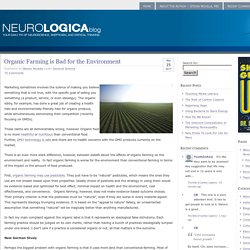
The organic lobby, for example, has done a great job of creating a health halo and environmentally friendly halo for organic produce, while simultaneously demonizing their competition (recently focusing on GMOs). These claims are all demonstrably wrong, however. Organic food is no more healthful or nutritious than conventional food. Further, GMO technology is safe and there are no health concerns with the GMO products currently on the market. There is an even more stark difference, however, between beliefs about the effects of organic farming on the environment and reality.
Pesticides On Food. Her er fordelene og ulempene ved økologisk frukt og grønnsaker. Dette er bra med økologisk – og dette fungerer ikke fullt så godt.
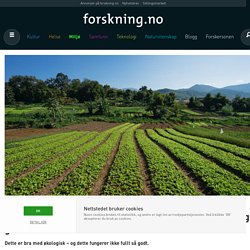
Hvor sunt er egentlig økologisk jordbruk, for naturen og oss mennesker? Denne måten å dyrke jorda på er her definert som å følge regelverk for økologisk jordbruk. De varierer fra land til land, men innebærer for eksempel at bøndene lar være å bruke syntetiske plantevernmidler når de skal dyrke blant annet korn og grønnsaker. Den kan være positivt for planter og bier, men i mindre grad for fugler. Økologisk kan også være mer lønnsomt for fattige bønder fordi de ofte får bedre betalt for disse varene, i hvert fall hvis de er med i ordninger for rettferdig handel. Men økologisk jordbruk gir som oftest mindre avlinger og bøndene produserer mindre mat på samme areal.
Forbrukerne må ofte betale mer. Det konkluderer to kanadiske forskere som har gått gjennom mye av den eksisterende forskningen på økologisk jordbruk. 19 Years of Feeding Animals GMO Shows No Harm. Often GMO critics will argue that the biotech industry is conducting a massive experiment with our food supply by introducing genetically modified organisms.
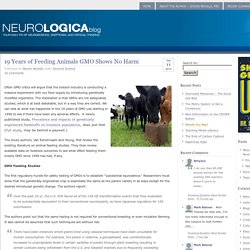
The implication is that GMOs are not adequately studied, which is at best debatable, but in a way they are correct. We can look at what has happened in the 19 years of GMO use starting in 1996 to see if there have been any adverse effects. A newly published study, Prevalence and impacts of genetically engineered feedstuffs on livestock populations, does just that. Pesticide Residues, Results from the period 2004-2011. The Difference Between Organic and Sustainable Food.
Updated September 04, 2018 Sustainable and organic do not mean the same thing. Beyond the limited scope of the U.S. Department of Agriculture's National Organic Program (NOP), there are no strict rules set up to ensure that organic farmers or organic food production operations follow eco-minded practices. For members of the organic industry, it's important to be realistic about the limits of organic certification.
Which Pesticides Can Be Used in Organic Farming? Just because agricultural practices are organic does not mean they are 100 percent free of pesticides.
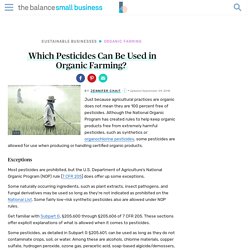
Although the National Organic Program has created rules to help keep organic products free from extremely harmful pesticides, such as synthetics or organochlorine pesticides, some pesticides are allowed for use when producing or handling certified organic products. Exceptions Most pesticides are prohibited, but the U.S. Department of Agriculture’s National Organic Program (NOP) rule [7 CFR 205] does offer up some exceptions. Some naturally occurring ingredients, such as plant extracts, insect pathogens, and fungal derivatives may be used so long as they're not indicated as prohibited on the National List.
Get familiar with Subpart G, §205.600 through §205.606 of 7 CFR 205. How to Get USDA Organic Certification. Top Myths About Organic Food. Pesticides are bad.
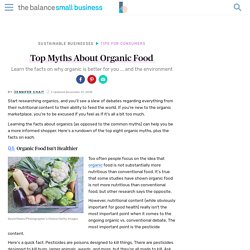
Very bad. Beyond the fact that pesticides are poisons designed to kill, many of them (organochlorine pesticides in particular) are absorbed by the human body in such a way that even long after you ingest them, they remain in your body, building up as the years go by. In fact, consider this: DDT is an organochlorine pesticide that everyone thought was safe, but as it turns out, DDT was seriously dangerous and was banned in 1972. With this in mind, you'd think DDT would have vanished. However, the effects of DDT were so strong that it's still showing up in the bodies of people today, including in people born after DDT was banned. Additionally, runoff from pesticides used on farms or during production is known to kill animals, plants, trees and cause pollution.
— Code of Federal Regulations. Organic Authority - Live an Organic and Healthy Lifestyle! Is Eating Organic Really Better for You and the Environment? On average, organic food items are 47 percent more expensive than standard supermarket fare—but thanks to their purported health and environmental benefits, many shoppers still splurge on them.
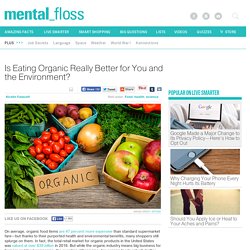
In fact, the total retail market for organic products in the United States was valued at over $39 billion in 2016. But while the organic industry means big business for farmers and food companies, the question still remains: Are organic foods actually better for both you and the environment? In the video below, AsapSCIENCE co-creator and host Mitchell Moffit explains why eating organic may not be the panacea most people think it is. Contrary to popular belief, an organic diet isn't chemical-free. In fact, Moffit explains, organic farmers can still use natural pesticides and fungicides to keep crop-destroying insects at bay—and studies show that they aren’t necessarily better for you or the soil than synthetic ones. Labels tend to be misleading, too. [h/t Science Alert] Organic Pesticides. Have you seen the pro-organic propaganda video with the happy family who switches to organic only food and the pesticides disappear from their urine?
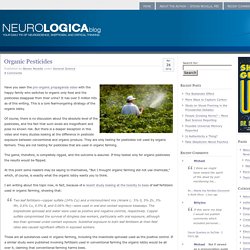
It has over 5 million hits as of this writing. This is a core fearmongering strategy of the organic lobby. Of course, there is no discussion about the absolute level of the pesticides, and the fact that such levels are insignificant and pose no known risk. But there is a deeper deception in this video and many studies looking at the difference in pesticide exposure between conventional and organic produce.